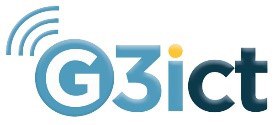Shaping an Inclusive Digital Future: Our Work on the Global Digital Compact
Posted on June 26, 2025

Director of Advocacy and Capacity Building, G3ict
It was an honor to speak at the United Nations Conference of States Parties to the Convention on the Rights of Persons with Disabilities (CRPD) this week. The focus of my presentation was a topic incredibly close to my heart and central to G3ict's mission: the United Nations Global Digital Compact (GDC) and its profound implications for persons with disabilities.
The GDC is more than just a document; it's a comprehensive global framework designed to guide digital cooperation and the governance of artificial intelligence. It's a critical step towards ensuring that the rapid advancements in the digital world truly benefit everyone, leaving no one behind.
Our Journey with the GDC
Since November 2020, G3ict has been deeply immersed in the development of the GDC and the broader AI governance landscape. Thanks to our ECOSOC status, we've had a seat at the table, actively contributing to thematic roundtables, submitting detailed inputs and statements, and helping to shape both the GDC Document and the AI Advisory Body Interim Report. This active engagement has been absolutely vital in ensuring that the framework genuinely aligns with the needs of all stakeholders, especially persons with disabilities.
Our advocacy has been far-reaching. We've participated in numerous Digital Inclusion Roundtables, contributed to side events at COSP16 and COSP17, and engaged in multi-stakeholder consultations leading up to the Summit of the Future. These platforms have been invaluable for fostering meaningful dialogue and collaboration. We've made specific contributions to the GDC's core, including definitions, elements, and principles of Digital Inclusion rights for persons with disabilities, all firmly aligned with the CRPD. These inputs have directly influenced the revised versions of the PACT for the Future and the GDC itself, as well as the UN AI Advisory Body Interim Report.
Our commitment to the GDC has also been formally solidified through key endorsements. We proudly endorsed the Compact at the 12th M-Enabling Summit in Washington, DC, in October 2024. More recently, in April 2025, we submitted a Joint Commitment with the International Disability Alliance (IDA) at the Global Disability Summit in Berlin, Germany. These actions underscore our unwavering support for the Compact's vital goals.
Why the GDC Matters for Digital Accessibility
G3ict's involvement in shaping the GDC is rooted in our belief that digital accessibility is a fundamental human right. The Compact explicitly affirms the rights of persons with disabilities and sets an ambitious target: to increase the availability, accessibility, and affordability of digital technologies by 2030.
By championing the GDC, we're ensuring that the development of AI-driven solutions – from assistive technologies and real-time captions to AI-powered mobility aids and personalized learning tools – is approached with ethical standards and inclusivity at its core. Beyond technology, our advocacy also promotes crucial capacity-building initiatives. It's about equipping persons with disabilities with the digital skills they need to fully participate in their countries' socio-economic development and thriving digital economies.
Ultimately, G3ict's endorsement of the GDC strengthens global efforts to harness AI for empowerment, ensuring that persons with disabilities are active participants in shaping the digital future, not passive recipients or, worse, left behind.
A Framework for Human Rights in the Digital Age
The GDC is anchored in international law, including human rights law. Its overarching aim is to leverage digital technologies to advance all human rights, including those of persons with disabilities. The Compact includes specific clauses addressing crucial areas like digital literacy, skills, capacities, digital public goods and infrastructure, human rights, digital trust and safety, data, and robust follow-up and review mechanisms.
Within these clauses, the GDC clearly outlines requirements for digital accessibility, targets capacity-building digital skills for persons with disabilities, and specifies the availability of disaggregated data by disability status. It also promotes the adoption of open standards and interoperability, upholds international human rights law, emphasizes involving persons of all abilities in product development cycles, establishes accessible reporting mechanisms, and strengthens efforts to collect and analyze disaggregated data.
It's important to remember that while the GDC is not a legally binding instrument, it serves as an indispensable framework. It sets global principles and guidelines for digital governance, outlining key commitments for governments, businesses, and civil society. Its purpose is to coordinate international efforts, promote best practices, and encourage voluntary commitments to ensure an open, inclusive, and secure digital future for everyone.
Bridging the Gaps: The DASH Work Group
One significant challenge we've observed is that industry and civil society often share digital inclusion goals but tend to work in silos. Within companies, accessibility and UN engagement teams might have different priorities. And critically, UN-level processes frequently lack adequate representation from persons with disabilities.
To address this, G3ict launched our Digital Accessibility, Guidelines, and Standards Harmonization (DASH) Work Group. This innovative platform is designed to normalize dialogue between Organizations of Persons with Disabilities (OPDs) and the private sector, fostering shared language and joint messages. It aims to bridge internal gaps within companies and create vital feedback loops between strategic planning and lived experience.
The DASH Work Group has ambitious priorities, including monitoring and influencing through UN advocacy, organizing awareness-raising campaigns, developing educational materials, hosting webinars, creating a repository on market fragmentation and standardization, and addressing emerging areas of standards. All these efforts are geared towards promoting robust digital accessibility policies, ensuring access to affordable and inclusive digital infrastructure, raising awareness of accessible technology, strengthening capacity through training and partnerships, and holding stakeholders accountable for respecting and ensuring the digital inclusion and accessibility rights of persons with disabilities.
We envision close collaboration across sectors:
- Monitoring & Implementation: Civil society can document lived experiences and contribute to GDC reviews, while industry can share implementation updates and co-author case studies. Jointly, we can host informal roundtables with UN missions.
- Capacity Building: Civil society can identify grassroots needs and support local training, while industry can offer training or mentorships. Together, we can develop shared toolkits and webinars.
- Standards Harmonization: Civil society can identify standard implementation challenges, while industry can map internal standards usage and share insights and challenges. Collaboratively, we can build a comprehensive standards repository with OPD input.
Benchmarking Progress: The DARE Index
To track progress and hold stakeholders accountable, G3ict has just launched the third edition of our Digital Accessibility Rights Evaluation (DARE) Index. This benchmarking tool, developed by advocates for advocates, is a collaborative effort with national, regional, and international advocacy organizations of persons with disabilities, including the European Disability Forum (EDF), World Blind Union (WBU), International Disability Alliance (IDA), and Disabled People’s International (DPI).
The DARE Index rigorously assesses country progress in making Information and Communication Technologies (ICT) accessible for all, in full compliance with Article 9 of the Convention on the Rights of Persons with Disabilities (CRPD). Crucially, the third edition of DARE Index 2025 includes specific questions about the GDC to evaluate the extent of alignment across countries, particularly from the perspective of artificial intelligence governance-based policies, programs, and digital inclusion rights-related outcomes.
Looking Ahead
The United Nations Global Digital Compact is an absolutely vital framework for digital cooperation and the governance of artificial intelligence. Through the dedicated efforts of G3ict and our DASH Work Group, we are steadfastly working towards an inclusive, open, safe, and secure digital future that respects and promotes human rights for all.
I'm incredibly optimistic about our continued collaboration in advancing these important goals. The digital world is evolving at an unprecedented pace, and it's imperative that we shape it with intent, ensuring that everyone can participate fully and equally.
United Nations – Conference of States Parties (COSP) To the Convention on the Rights of Persons with Disabilities (CRPD) June 10th – 12th, 2025 United Nations Headquarters – New York
Second Roundtable “Leaving no one behind: using AI as a tool for supporting inclusivity to strengthen the participation of persons with disabilities” Wednesday June 11th, 2025 – 3:00 – 6 PM (Conference-Room 4)
Panel Presentation Mohammed Ali Loutfy PhD G3ict Director for Capacity Building and Advocacy
Excellencies, Co-chairs, Ladies and gentlemen. This afternoon, I am honored to present on the United Nations' Global Digital Compact (GDC), a comprehensive global framework for digital cooperation and governance of artificial intelligence. This presentation will highlight the involvement of G3ict in the development and implementation of the GDC.
Since November 2020, G3ict has been actively contributing to the GDC and AI Governance through its ECOSOC status. Our involvement includes participation in thematic roundtables, submitting inputs and statements, and contributing to the development of the GDC Document and the AI Advisory Body Interim Report. This engagement has been crucial in shaping the framework and ensuring that it aligns with the needs of all stakeholders, particularly persons with disabilities.
Our advocacy efforts have been extensive, including participation in Digital Inclusion Roundtable, side events at the Conference of States Parties to the Convention on the Rights of Persons with Disabilities (COSP16 & COSP17), and multistakeholder based consultations and dialogues leading to the Summit of the Future in September 2024. These events have provided platforms for meaningful dialogue and collaboration. G3ict has made significant contributions to the GDC through various submissions, including the definitions, elements, and principles of Digital Inclusion rights of persons with disabilities aligned with the CRPD, to the subsequent revised version of the PACT for the Future, the GDC, as well as the UN AI Advisory Body Interim Report. These submissions have helped shape the direction and content of the GDC.
G3ICT’s endorsement of the GDC at the 12th M-Enabling Summit in Washington, DC, on October 15, 2024, and the submission of a Joint Commitment with the International Disability Alliance (IDA) at the Global Disability Summit 2025 in Berlin, Germany, on April 2, 2025, have further solidified our support for the Compact and its goals.
G3ict has been actively involved in shaping the GDC by contributing research, policy recommendations, and advocacy efforts. Its endorsement of the Compact reinforces the importance of digital accessibility as a fundamental human right, aligning with the Convention on the Rights of Persons with Disabilities (CRPD). The GDC explicitly affirms the rights of persons with disabilities and commits to increasing the availability, accessibility, and affordability of digital technologies by 2030.
By supporting the GDC, G3ict ensures that AI-driven solutions—such as assistive technologies, real-time captions, AI-powered mobility aids, and personalized learning tools—are developed with ethical standards and inclusivity at their core. G3ict advocacy also promotes capacity-building initiatives to equip persons with disabilities with the necessary digital skills to fully participate in scaling-up their countries’ socio-economic economic development and digital economies.
G3ict’s endorsement of the GDC strengthens global efforts to harness AI for empowerment, ensuring that persons with disabilities are active participants in shaping the digital future rather than being left behind.
The GDC is anchored in international law, including human rights law, and aims to harness digital technologies to advance all human rights, including the rights of persons with disabilities. Specific clauses within the Compact address digital literacy, skills, and capacities, digital public goods and infrastructure, human rights, digital trust and safety, data, and follow-up and review.
The GDC includes several clauses that affirm the requirements for digital accessibility, target capacity-building digital skills for persons with disabilities, specify the availability of disaggregated data by disability status, promote the adoption of open standards and interoperability, uphold international human rights law, involve persons of all abilities in product development cycles, establish accessible reporting mechanisms, and strengthen efforts to collect and analyze disaggregated data.
It is important to note that the GDC is not a legally binding instrument. Nevertheless, it is a framework that sets global principles and guidelines for digital governance and establishes key commitments for governments, businesses, and civil society. Its purpose is to coordinate international efforts, promote good practices, and encourage voluntary commitments to ensure an open, inclusive, and secure digital future.
Industry and civil society share goals around digital inclusion — but often work in silos. Within companies, accessibility and UN engagement teams may not always have the exact same priorities. In addition, UN-level processes frequently lack representation from persons with disabilities.
G3ict launched its Digital Accessibility, Guidelines, and Standards Harmonization (DASH) Work Group that act as a platform to normalize dialogue between OPDs and private sector, create shared language and joint messages, bridge internal gaps in companies, and build feedback loops between strategy and lived experience.
The DASH Work Group has several priorities, including monitoring and influencing through UN advocacy, organizing awareness-raising campaigns, developing awareness-raising materials, hosting webinars, creating a repository on market fragmentation and standardization, and addressing emerging areas of standards. These efforts aim to promote digital accessibility policies, access to affordable and inclusive digital infrastructure, raise awareness of accessible technology, strengthen capacity through training and partnerships, and monitor and hold stakeholders accountable to respect and ensure rights of persons with disabilities to digital inclusion and accessibility.
Monitoring & Implementation: Civil society can document lived experience and contribute to GDC reviews, while industry can share implementation updates and co-author case studies. For instance, jointly, they can host informal roundtables with UN missions.
Capacity Building: Civil society can identify grassroots needs and support local training, while industry can offer training or mentorships. Jointly, they can develop shared toolkits and webinars.
Standards Harmonization: Civil society can identify standard implementation challenges, while industry can map internal standards usage and share insights and challenges. Jointly, they can build a standards repository with OPD input.
G3ict has just launched the process for conducting the third edition of its Digital Accessibility Rights Evaluation (DARE) Index. A benchmarking tool developed by advocates for advocates, is conducted by G3ict in collaboration with national, regional, and international advocacy organizations of persons with disabilities, such as European Disability Forum (EDF), World Blind Union (WBU), International Disability Alliance (IDA), and Disabled People’s International (DPI). This advocacy tool benchmarks country progress in making Information and Communication Technologies (ICT) accessible for all, in compliance with Article 9 of the Convention on the Rights of Persons with Disabilities (CRPD). The third edition of DARE Index 2025 includes questions about the GDC to evaluate the extent of alignment across countries, particularly from the point of view of artificial intelligence governance based policies, programs, and digital inclusion rights related outcomes.
In conclusion, the United Nations' Global Digital Compact is a vital framework for digital cooperation and governance of artificial intelligence. Through the efforts of G3ict and the DASH Work Group, we are working towards an inclusive, open, safe, and secure digital future that respects and promotes human rights for all. Thank you for your attention, and I look forward to our continued collaboration in advancing these important goals.




























